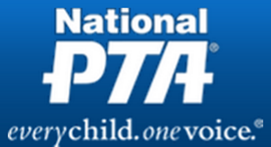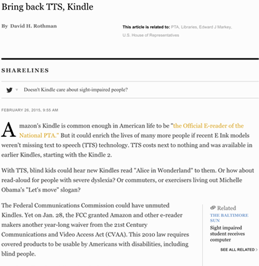Get ePub or Kindle file of this
 Remember LibraryCity’s pleas to Amazon to unmute E Ink Kindles? Now the five-million-member National PTA is following up.
Remember LibraryCity’s pleas to Amazon to unmute E Ink Kindles? Now the five-million-member National PTA is following up.
As revealed in my Baltimore Sun op-ed, set to appear in print tomorrow, the PTA is asking Amazon about the text to speech missing from the Paperwhite and even the $200 Voyage. Thanks!
Likewise helpful would be a special font for people with dyslexia, as well as optional all-text bolding for older booklovers and others needing it. I myself can read more easily with all-text bold to increase perceived contrast between text and background. So far, however, I’ve gotten nowhere with Amazon.
Per e-reader, we’re talking more or less about the cost of a Big Mac to help customers and potential customers with special needs. Check out this Q & A with Shaun K. Kane, a computer scientist at the University of Colorado at Boulder who has devoted years to accessibility issues.
 Fixing the omissions would be the rational thing to do even by cold-blooded MBA standards.
Fixing the omissions would be the rational thing to do even by cold-blooded MBA standards.
The Kindle, after all, is the Offical e-Reader of the National PTA, and if Amazon makes the E Ink Kindles more helpful to people with disabilities, Jeff Bezos & friends will expand their K-12 market and others.
We’re not just talking here about the more than 20 million Americans who are either blind or can’t see as well as they should even with glasses. Tens of millions of people in the U.S. suffer to some extent from dyslexia.
 With the E Ink Kindles’ access-related shortcoming so clear, the op-ed calls for the FCC to enforce requirements from 2010 legislation.
With the E Ink Kindles’ access-related shortcoming so clear, the op-ed calls for the FCC to enforce requirements from 2010 legislation.
Also, Sen. Edward J. Markey of Massachusetts should seek clarifications in the law that he coauthored while in the House of Representatives—so it’s more lobbyist-proof.
But in Jeff B’s place, I would not wait for a requirement. I would just act. Follow an old PR rule. Get the bad publicity over with and commit now to read-aloud and the most accessible typography in E Ink Kindles.
Meanwhile here’s an excerpt from the op-ed, making further arguments why an unmuting be good for Amazon shareholders:
“Having written on e-book-related matters since the early 1990s, I can tell you that Amazon actually would come out ahead with the restoration of audio to E Ink Kindles. It makes money off content, not just devices. And TTS means that people would have more time to enjoy books. They could start them on the jogging path in audio and finish them the usual way. Furthermore, related audio capabilities in new E Ink Kindles would broaden the market for audiobooks from Amazon’s Audible division.
“I’m a huge fan of Amazon’s better side—I buy most of my electronics there—but the read-aloud muting reminds me of another blunder: the overpriced, over-featured Amazon phone. Other steady customers can join me in complaining to jeff@amazon.com.”
The excuses from Amazon and other e-reader-makers: The claim is that the Kindle is not primarily an “Advanced Communication” device covered by the 21st Century Communications and Video Accessibility Act (CVAA). So, the reasoning goes, the FCC may exempt e-book-device manufacturers from the act. But the Kindle does contain a Web browser that works with e-mail. Furthermore, you can even read long e-mailed files in the e-book mode.
If nothing else, consider the low cost of adding TTS and navigational capabilities for the blind. The exemption is meant to avoid onerous burdens on vendors. We’re not talking about such burdens here.
With all those factors taken into account, the exemption is nothing short of absurd. Sen. Markey himself has said that the FCC “should reject efforts to dilute or delay the law’s mandates, which are intended to provide full access for Americans with disabilities to the technological tools vital to complete participation in 21st century society.” Notice the F word. Full. Too bad the FCC let regulatory lobbyists interpret the law for it, especially when so many schools and libraries plan will rely increasingly on e-books.
The good news is that the FCC could have made the exemption permanent rather than temporary, year to year. Still, the agency could have done much better, given the evidence against a waiver.
Similar Posts:
- Ouch! Text to speech is also AWOL from THIS year’s Paperwhite from Amazon
- No text to speech in Amazon’s new Paperwhite Kindles: Why? To push us toward Fire tablets and boost Amazon-owned Audible?
- PTA President Otha Thornton wimps out on Kindle read-aloud issue, in reply to my Baltimore Sun op-ed
- How blind-friendly are Amazon’s Kindle apps for the iPhone and iPad? And what about those for other operating systems?
- Get our e-mails